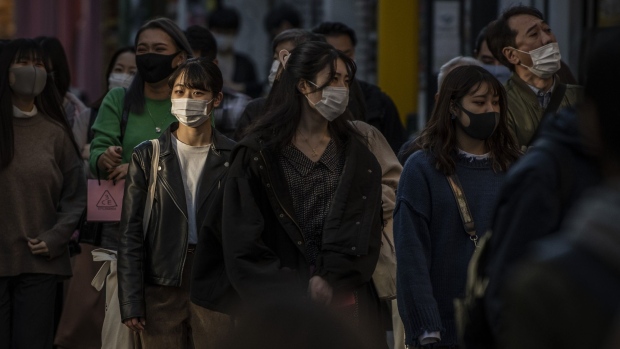Nov 17, 2020
Japan cases hit record as Tokyo plans to raise virus alert
, Bloomberg News

Japan’s daily COVID-19 cases rose to a record of more than 2,000, according to local media tallies, as the nation that had previously shown success in containing the virus now faces a rapid spread of the pathogen.
Infections in Tokyo jumped by 493 -- surpassing a previous daily high set in August -- while other regions in Japan including Kanagawa and Shizuoka prefectures also reported records.
The capital is making arrangements to raise the city’s COVID-19 alert to the highest level, the Nikkei newspaper reported. Officials are expected to make the decision on Thursday at a meeting of experts. Among the measures considered is requesting businesses to close early, the paper reported, citing several unidentified people.
Tokyo and its neighboring prefectures account for about a third of the nation’s gross domestic product, so any increased spread in the region could deal an additional blow to the Japanese economy, especially if officials take more stringent policy measures.
Investors sent Japanese shares lower as the deteriorating virus situation overshadowed optimism that COVID-19 vaccines are near. The Nikkei 225 Stock Average lost 1.1 per cent on Wednesday, after climbing to its highest level since 1991 the previous day.
Virus cases have been picking up rapidly over the past weeks. NHK reported Wednesday’s nationwide count as 2,189, topping the previous record on Saturday.
The rise in cases comes as the virus is surging globally with the onset of colder weather in the northern parts of the world. While Japan’s numbers are low compared with other countries, the increase is a reminder that, in the absence of an effective vaccine, even the most successful countries at containing the virus are vulnerable to resurgences. South Korea, whose strategy has also been admired across the world, on Wednesday reported the highest number of cases since August.
Global Spotlight
Japan has drawn attention for its ability to control the spread of the virus without mass-testing or enforced lockdowns. Despite two previous flareups, deaths and serious cases remain low, and hospitals haven’t been pushed to capacity. Life had been returning to normal, with sporting matches resuming and workers returning to offices.
But in recent weeks, officials have expressed concern over the increasing variance of infection clusters, with cases rising in nursing homes, hospitals and schools. Experts have pointed to a rising spread among younger adults tired of social distancing, as well as within foreign communities, which may struggle due to language barriers and more limited access to health services.
Officials appear to be acting with greater urgency than during Japan’s earlier COVID-19 waves this year. In the government’s strongest warning yet, Yasutoshi Nishimura, the minister overseeing the country’s coronavirus response, said last week that more stringent steps would be needed if infections continued to rise.
A raised alert level isn’t expected to lead to harsh lockdown measures, however. The government lacks the legal means in Japan, and is anxious to get the country’s recessionary economy back on track. When the country declared a state of emergency in April to contain the first wave of the virus, it didn’t compel people to stay home or businesses to shut. Businesses nonetheless complied to government requests to close or shorten hours, while many citizens refrained from going out.
This time around, government officials so far have taken incremental steps toward restrictions. As cases have picked up on Japan’s northern island of Hokkaido, the city of Sapporo is requesting that residents stay home as much as possible.
Regions including Aichi and Osaka are planning to limit eligibility of the nation’s “Go To” eat campaign -- aimed at getting residents to dine out -- to parties of four or less. And the Japan Tourism Agency is asking travel agencies to implement measures such as prohibiting eating and drinking on buses, NHK reported. Chief Cabinet Secretary Katsunobu Kato said Wednesday however that there is no need to stop travel between regions across the board.
Japan is also looking at infection controls for next year, in anticipation of the Olympic Games in Tokyo, which were delayed from this summer. International Olympic Committee President Thomas Bach met this week with Prime Minister Yoshihide Suga, saying the two sides were compiling a “huge toolbox” to counter the pandemic and possibly allow spectators to attend.
--With assistance from Kazunori Takada.
